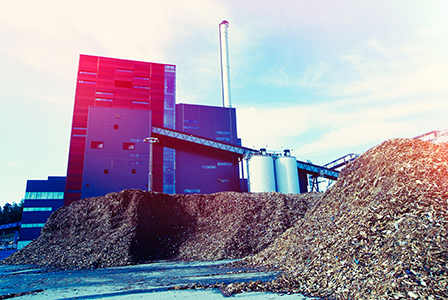
May 27, 2018
Disasters—whether natural or human-caused—tend to spur action.
They also draw out the opportunists.
We saw this during the ten-year drought when mountains of stressed trees were overtaken by opportunistic bark beetles. Today, the U.S. Forest Service estimates there are up to 129 million dead trees in California’s forests.
Some—nowhere near all—of these trees needed to be removed to protect small towns and neighborhoods in forest regions. In 2015, the governor released an emergency executive order and established the Tree Mortality Task Force to figure out how to best tackle the issue.
Enter another variety of opportunist: lobbyists and trade association leaders representing the biomass incineration industry and the logging industry. Suddenly, in 2016, legislation was passed and signed that extended the contracts for six old, expensive and polluting biomass incinerators.

These incinerators are essentially giant ovens or kilns that burn tons of wood chips and generate electricity. As they do this, they also create, on average, one-and-a-half times more climate pollution than a coal-fired power plant and three times as much pollution as a gas-fired power plant.
The 2016 legislation forces utilities to buy power from these incinerators at more than twice the average cost of non-polluting renewable energy. In exchange, the plants are required to burn an increasing number of dead trees.
Then, last year, Californians endured the wind-driven wildfires that devastated communities from Ventura to Santa Rosa. Now, behind-the-scenes negotiations and bill proposals about fire response abound.
The biomass and logging lobbyists seem to see this as another “opportunity” for their clients.
Specifically, using a drumbeat of misinformation about the tree mortality crisis, fires and biomass incineration, the industry lobbyists are pushing legislative language that would create a permanent requirement for utilities to buy more biomass energy.
As I write this, there is at least one bill being developed that would create a mandate that utilities buy a specific amount of biomass energy forever. The mandates are based on biomass energy’s inclusion in the renewable portfolio standard.
Is biomass renewable? Well, when one cuts down a tree to be incinerated, another tree may be planted to replace it. But it takes decades for a seedling to mature. Is biomass clean? Definitely not.
Yet, we hear that lobbyists in the biomass industry are telling legislators that biomass incineration is “carbon neutral”. Their claim was bolstered in April by U.S. Environmental Protection Agency Administrator Scott Pruitt, a friend of all things combustion, who announced that EPA would consider energy-producing biomass plants using wood from forests as carbon neutral.
Unfortunately, even California legislators who should know better believe these claims and are supporting biomass incineration. The governor has also encouraged the biomass incineration industry.
The biomass proponents come to carbon neutrality through a very hypothetical path. They assume that each tree that is burned will be replaced by a tree that, in 40 to 100 years, grows up and absorbs and stores as much carbon as was released when the first tree was burned.
Their assumption is unwarranted.
As four scientists wrote in an op-ed in the New York Times recently, “Burning wood from forests to generate electricity is not carbon neutral when the direct emissions from combustion, plus emissions from soil and logging and processing wood, are considered. Scientific studies have shown that it will worsen the consequences of climate change for decades or through the end of this century”.
There are other uses for beetle-infested trees that must be felled. Mulch, furniture, and flooring are among them. What’s needed now is a strong, data-rich plan for how to deal with the trees without continuing biomass burning.
So now it’s time for Sierra Club members and supporters to take the opportunity to express that.
Call your assembly member today. (You can find out who your assembly member is and get contact information here.)
Tell whoever answers—even if it’s a machine—that you don’t want your assembly member to vote for any bills that will extend or expand biomass incineration.
It’s time the state elected officials use this opportunity to help us all step away from conventional biomass incineration.
Sincerely,

Kathryn Phillips
Director
Sierra Club California is the Sacramento-based legislative and regulatory advocacy arm of the 13 California chapters of the Sierra Club.
Please consider making a monthly donation.